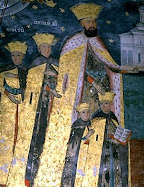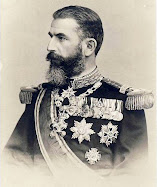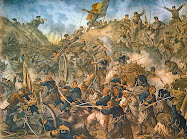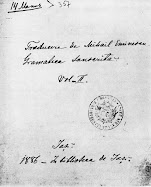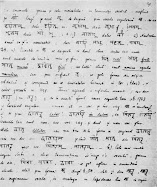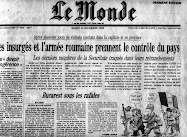
Cezar Ivanescu’s Poetry
An abusive regime above all, communism was seeking in its own peculiar way for the mystification of origins. Everything that belonged to the past seemed to its ideologists to be doubtful because it took the risk to reveal the lack of organic insertion in the evolution of mankind, in other words the legitimacy. Whenever it could not be forged in the propagandistic workshops, which used to make out rudimentary distortions upon somebody’s disposal, the more recent or more remote past was simply put between the parentheses of a compulsory amnesia. Thus the target was not only the installation of a collective amnesia, but also the cutting of the roots of the spiritual life, the endulging into the darkness of the consciousness out of which one could mould easily the Orwellian robots wearing the deadly label of „the new dehumanized man” . Yet, showing a great deal of optimism, Mircea Eliade visualized the dawn of a salvation: „Yet, it could be possible that this deadly danger ended in an extraordinary spiritual reaction which could equal to the installation of a new way to exist and cause at the level of the cultural creation what meant the settling down caused by the Tartars’ great invation at the level of the State foundation seven centuries ago. The Soviet occupation and the attempt of denationalization made by the Russians with methods and means of Pharaohs represent, by the spiritual counter-offensive which they cause, the real admission of Romania in the cultural history of Europe.” At the level of the literary creation, Eliade’s prognostication dated 1953 was to be confirmed only partially together with the appearance of an important wave of writers who could show their talents, thanks to the so-called liberalization allowed by the totalitarian authorities by 1965. Symptomatically speaking, the so-called poets of the 60’s endeavour to draw back the hands of the historical clock, removed in an arbitrary way by those fervents of the red utopia who made again the connection with the tradition especially with that of the inter-war poetry. But with none of them the redeeming of the origins touches the ardent intensity to the visionary outburst shown by Cezar Ivanescu’s lyrical poetry. Representative of a second wave of this poetry (he made his first editorial appearance in 1968) he did not have the chance of a quick recognition as well as the representatives of the first wave (Nichita Stanescu, Marin Sorescu, Ioan Alexandru, Ion Gheorghe, etc.). Maybe also due to the striking novelty of his production which has nothing to do with our poets between the two World Wars, as hard as a rock towards which there are no paths at all, all these circumstances make him, of course, more puzzling and more intriguing for the criticism which out of the impotence of framing him easily in a series or another sees itself forced to gloss first of all his originality.
Cezar Ivanescu starts from an ancient Orphic conception of creation which states the interweaving of lyricism with the song conferring it the status of an oracle. If the famous pre-Homeric bard, of a Thracian origin, to whom even Apollo might have given his own lyre was both a poet and a minstrel, let us not forget that Eutherpe too inspired both lyrical poetry and music. In the beginning, this poetry was a singing not only in the figurative but also in the proper sense of the word. A creation fixed in the tune before it was fixed in words (writing risking highly to produce the allienation of the genuine thought, according to Plato’s opinion). It’s not by accident that Cezar Ivanescu makes shows of poetry sung with accompaniment of musical instruments conferring the verse his voice of a virile harmony, of an overpowered pathetism. Shows in which (I had the occasion to participate in one of them in the medieval cathedral of a burgh in Transylvania) the solemnity goes hand in hand with the sensual impulse, both of them emphasizing each other in the bound of an incredible creation. To this genre of a mixed representation which ressurects an old manner lost in the Guttemburg Galaxy there corresponds the following gallant-troubadouresque text: „ ! Whitest Wife of mine / Scented Sun of mine / I can barely see you / every seven days; // pure blood as water / dries under the curse / and freezes my mouth / how shall I call thou?// ! Whitest Wife of mine / Scented Sun of mine / I can barely see you / every seven days , // Whitest Wife of mine / Scented Sun of mine / I can barely see you / every seven days ! // ! our marriage bed / whitest and untouched / like the land in winter / and covered by snows // seven nights in one / I don’t know and it / rejects me like womb / laying me on ground, // seven nights in one / I don’t know and it / rejects me like womb / laying me on ground, / Whitest Wife of mine / Scented Sun of mine / I can barely see you / every seven days ! ” (The Fourth Level of Seed Time and Harvest [The Old Child]). Of course the repetitive aspect, the use of the refrain old songs have the duty of bringing affective obsession to the level of incantation. But the poet goes down deep to the sensitive temporality taking pleasure in rigid archaic tones: „! Please stay here, oh, my Lord, please stay, // don’t go to heaven, / oh, my Lord, please stay // ’cause Death is above us all, / oh, Lord, please don’t go / ’cause Death is at the door, / oh, Lord, don’t go... / if you go we’ll be on / fire, / please, please, don’t go !” (Doina [At the End]. Here we come across a prototype of the poetic verse with its use in statu nascendi in the dawn of the artistic production that folklore registers. The peasant – like melancholy is cought in its intrinsic vein, at the crossing of Eros with Thanatos like a first confusion of the spirit, in a mixture of fresh and exhaust of primary suffering and premature rafinement: „! let your hair grow and flow / it’s the longest in the world / wrap your body clean like weep / with a shroud to keep in it / smooth and ever flowing smooth, / like a wisper of amen...// I’m your only stranger now...// you don’t come and I don’t come / make me weired with your wine / where is wine I find the venom / I no longer come again // where I come I find the venom...// and know nobody to bow,/ on what pillow I can lean,// I don’t know how I can whisk / like the little alder tree,/ there’s no trouble where I go / like a mother to be so / there’s no trouble where I go...// where I go with Death I go / Mother of the longest hair,// where I go with Death I go / Mother of the longest hair !” From Arghezi onwards we have not had at all such proofs of the paradoxical manoeuvre between elementary and complex, between simplicity and subtlety, like an unsearched call of the soul. Only that here the simulation of orality makes room to a new living, to an emotional experience similar to the one which gave birth to it. If the author of Adequate Words was a scriptic above all, making the essence of primitivism burst out of the letter, Cezar Ivanescu is an oral who gets the effects out of the sung word, unchaining his own music in the atmosphere of a syncretic art. Thus, our contemporary has the air not to create according to folkloric patterns but to produce folklore. Cezar Ivanescu represents the rare case of a folklore producer able to descend with a great deal of unaffectedness from the condition of a well-educated poet to that of an oral poet, as well as an individual in a trance would transpose himself in his childhood.
The aspiration to primordiality is an aspiration to universality. Trying to reconstitute, the author of Seed Time and Harvest aspires to a synthesis, to a mixture of inner themes and of personalized procedures with others of collective order which can suggest the picture of the universe in its dizzing texture of contradictions, in its mumbling dialectics as well as a vulcano in its eruption. Its solitude is not an aim in itself, but a tool, an instrument of the sublime return on the deceiving universal context. As well as Cioran, Cezar Ivanescu could write like this: „Loneliness will no longer be sterile when through it world will belong to us, when we shall swallow it in our desperate ardours. What’s the use of all our loneliness if it is not the supreme conquest, if with it we cannot overcome everything? – Brothers, the supreme conquest, the last check up of our loneliness wait for us. This world must belong to us, to those who are more lonely, to those who have to get their life back! We are lost if we do not get back what we have lost, if we do not get everything back.” This „everything” is felt from the very beginning in the sphere of objective data through the mixture of times and cultures in a common reservoire of references. Out of the Hellenic, Hindoo, Biblical, Antique, Mediaeval and authentic mythologies, Cezar Ivanescu prepares a unique paste which he makes use of permanently. Yet, no trace of pedantry in his speech with elements which are less conceptual than emotional and graphical. The poet gives the impression that he translates his tumultuous feeling in several idioms: „! as happy as the Yogi in the millenary forest / in the chosen vessel of my being / you streamed the oil in the wind like Rimaya/ you know the Nirvana of my flesh / the chosen vessel, the light / of the vainglory of humiliation: you happy Yogi: / a thin wall keeps on resisting / virginal thin skin / as bitter as an almond / the virginity of nubile loneliness / crosses its fingers on your eyes / scattering in your ears / a handful of snails: guess who?/ Mary but Mary of Magdala : she will forgive / a lot from you because you loved her so - / and Time will press heavily / on your mouth – the impudent padlock / as red as your mouth endures the / chastity belt...” (Agamemnon [Rimaya]).
Involving a diversity of moral hypostases which have to do with Destiny, Nothingness, Immortality the inner universe of the poet reveals to us not less composite in its clutch of antimonies, in its tormented flow. This is a standard of life which persists in perpetuating, of the cosmos which troubled by the phenomenon of individualization wishes to get back to itself: „! I know a Country where people’s passions equal to hanging in many occasions for things or beings of an infinite nothingness as if they wanted to show one more time the ingratitude of a Destiny, the foundation of a world in a complete disagreement with their soul and also their infinite kindness which offers willingly to the nothings of the Nothingness whose mad attitude gives you the sensation that you are not among individuals living on the crust of the ground but closed hermetically in the ground living a life which is a survival of their own death and from down there their hearts beat with fear not to break.” (Agamemnon (Memorial]). Lasciviousness meets extinction through bitterness (of existential grief, as a spontaneous „philosophy”) which mediates dramatically between the two extremities. The absolute hallucinates in the links of the contingent in the same difficult process of the recuperation of a rejected whole: „! and sensuality looks for the purified ether similar to a condor which looks for the death of sensuality, an injection like a balsam in the core of a more general effusion.” (Agamemnon [Days]). Death itself relates to the liberating climbing of the purifying „metaphysical” sensation under the vaults of plenitude: „! The taste of flesh / is not perennial / nor heart is so / glorious as I thought : it / calms down without a reason ; we speak / then of a physical death oh, as / if it Existed: in the galleries / damp golden temples shining eyes / turn up the deceased: useless / seeds for an Earth / Eliberated from a metaphysical quietness !” (Agamemnon [Preface]). But in the same time the thrill of this disappearance is tackled on a solid popular ground, in a chivalrous licentious spirit. The bard seems to answer de Marquis de Saade’s proposal according to which „There is no better way to get acquainted with death than that of associating it with a licentious idea: „!my pals fled away from you / but you fled further / but you fled further / death eyerywhere, / death eyerywhere ! // come and try me / see if I flee further, / see if I flee further / Death everywhere, / Death everywhere ! // come, whore runner / and kiss my reddish mouth, / come, whore runner, / Death everywhere, / Death everywhere !” (Doina [Death Everywhere]). The frivolous approach of a terrible threat represents a temperamental and cheerful exorcism which, we guess, even Creanga and also Eminescu would have liked...
So, nothing is left apart. The temptation of the lonely ego „to get life back again”, to make :”the supreme conquest” of the world, embraces the whole series of the human, puts in motion all the strings of emotion in a greed of visionary universality which will reflect the cosmic universe. The more solitude is pressing („alone licking my tears up / and I liked their taste so much / that finally I knew how to be alone: / alone only in this way !”), the more powerful the desire to dissolve in the experience of the Whole, evidently impure in its dismay, tragic but hilar at the same time, under the inevitable star of damnation: „! we are cursed again and again / ’cause either we cry or laugh / and break in small tiny pieces like incense / the golden equilibrium the golden portion / the rule of blood: / only Death smiles and we, we Desperados / only Death cries - / and we, we Desperados !” (Agamemnon [The After-noon Blessing – of a Day]). From a religious point of view, Cezar Ivanescu swings foreseeably between faith („! nobody knows you, God, like me, nobody gave you, God, like me, / spirit and soul, body and flesh more than Your crucified Son, / that’s why I pray You, for ever be blessed”) and a pathetic scepticism („! Upon the end of world where Father, our Father in Heaven forgot us, / and where our Mother the Virgin with a smile of light created smile, / will not anoint my tearful body crucified for two thousand years, / there where nobody helps you, there I stayed all my life”), but at the level of solemn irreducible devotion our thought leads us rather to the Catholic Baudelaire than to the fluctuating agnostic Arghezi. Out of the appearances of chaos, of accidental, of the excessive propensity to flesh, of the delirious or only exquisite language, the poles of a pacification get near each other little by little and the forms of a harmony get out. We can forsee the core of an order. The convulsions calm down in various reflexive pictures, the dim impulses get conscious, because reason too belongs to the universal heritage and it cannot be removed from the perspective of the last ensemble. Thus, a Jeu d’Amour (Daena) gives us a synoptical conspectus of a Dantesque aspect, of the evolution of Eros, a three-phased illustrated theory of this one. The first one, The Stasis registers the exlcusivity of love, whose effect is the estrangement of everything which does not belong to it. Love as a tyrannical obsession arbitrary-purgatory: „ ! to tell you how much I love you, / I went so away from you, / and all that is strange of me / oh, my angel without you, / to tell you how much I love you, / and all that is strange of me / oh, my angel without you, / to tell you how much I love you !” The En-stasis shows the metaphysical decay of love, which involves the transition from oneness to duality, so the corruption of the primordial one: „! And from One we came to two / Lord of World sleeping in self, / and we are each a half since / both in you and me alike / and are That we two alike, / and we are each a half since / both in you and me alike / and are That we two alike ! // - ! between us dreaded abysm / and abysm in itself / and then monsters come with thousands poinson us / getting naked in World Eden.” And at long last The Ek-stasis points out the way from allienation to rediscovery by the returning of the lost ego in the medium of divine love: „! you wait for me with trembling Soul, / trembling of fear not to get / to You with long eyelashes / me the Divine Child who’s anointed / by God who cries after the balm of love !” Thanks to his nature his complex construction built up on original, his parables which go beyond the picturesque vibrating towards the infinite, Cezar Ivanescu’s poetry wants to be similar to the World.
Grigore Grigurcu
 Misterul mortii poetului Cezar Ivanescu, neelucidat inca
Misterul mortii poetului Cezar Ivanescu, neelucidat inca















































